By Jan Worth-Nelson
In an outdoor rally timed to correspond to the meeting of the University of Michigan Regents on the Flint campus Thursday, about 65 UM – Flint faculty, staff, alums and students gathered in chilly McKinnon Plaza to call for equity and fuller resources for the humanities at the downtown institution.
In almost every case, the participants and speakers shared deep and abiding Flint roots, and say they want the university in their own hometown to be fairly and adequately supported — and devoted to being a comprehensive university rather than one exclusively devoted to specialized degrees.

Participants in the One University rally in McKinnon Plaza at UM-Flint. (Photo by Tom Travis)
They represented a group called “One University,” a group of UM-Flint faculty, staff and students formed four years ago among other goals to advocate for equity in the distribution of UM’s wealth among the three campuses.
The emcee of the event was Alimatou Sarr, a UM-Flint junior studying political science and international studies.
She introduced five speakers: Librarian Zia Davidian, reading a statement for UM – Flint archivist Callum Carr; UM-Flint student government senator and political science major Jacquindre Brown; UM – Flint alum Asa Zuccaro, executive director of Flint Latinx Technology Community Center; Terae King, a UM-Flint political science student currently running for the Flint Board of Education; and UM Flint Associate Professor of anthropology Daniel Birchok.
Callum Carr (they/them) said they have lived in many Michigan cities, but had never found a town in Michigan that they wanted to call home more than Flint. “I came for the job but I stay for the community,” they said. “I invested in this community with my whole heart and soul because I thought that is what you do when you fall in love with a place and I’m in love with Flint.”
“So why can’t the University of Michigan love Flint too?
They voiced frustration with the UM – Flint drop in enrollment being the trigger for changes that might mean fewer resources for some of the campus’s programs.
“What we don’t understand is why we are being punished for those numbers instead of helped: I’m glad they (UM) could get over the water disaster so quickly and move on, but Flint could not,” they said.
Noting that UMF is supposedly part of an institution with a $17 billion endowment, and responding to rumors that a major investment is on its way to the Flint campus, “we have real concerns about how it will be used here and how it’s been used against faculty to silence our concerns.
“Let be real,” Carr stated. “It’s not just about the campus. The City of Flint is at stake here, too. UM’s campus underpins every business of Saginaw Street. This city is struggling to its feet after disaster and tragedy” and could use a “guiding light in that struggle.”
Speakers also voiced intense alarm at the UM’s hiring of Huron Consulting to assist in Flint’s “Strategic Transformation” effort propelled and being managed by UM – Flint Chancellor Debashish Dutta and his administration. The firm, formed by exiles from the disgraced accounting firm Arthur Anderson following the Enron scandal of the early 2000s, has gotten a reputation for “gutting” humanities and liberal arts programs nationally.
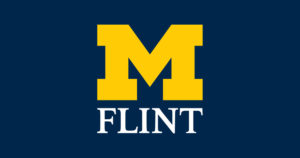
(Graphic source: www.umflint.edu)
“I’m begging the Regents,” Carr concluded, “for the good of this institution, for the good of this community, and for the tattered remains of my faith that the University of Michigan is more than just another heartless corporation — Help Flint.”
Amplifying concerns about what might happen under the feared influence of Huron Consulting, Jacquindre Brown said his own degree programs at UM – Flint are threatened in proposed cuts. He said Chancellor Dutta did not make him feel better, telling him regardless of what happens he will be able to finish his degree in his chosen discipline.
“The most important goal for me is to advocate for the benefit of students,” he said, but added that if “specialization” in the tech fields become the norm for the university, rather than a comprehensive approach, many students will be left out.
Terae King, a lifelong Flint resident and current candidate for the Flint school board, said while the UMF is “reimagining” itself, it needs “to reimagine how to make the University more affordable, accessible and equitable for all campuses.
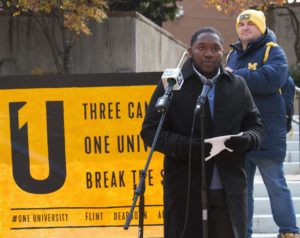
UM-Flint graduate Terae King speaks at the One University rally in McKinnon Plaza at UM-Flint. (Photo by Tom Travis)
Speaking as a first generation college student, King said “the barrier that prevents most people from attending is the tuition.
“I was fortunate enough to overcome this hurdle, however, I notice the other hurdle is the lack of resources our campus possesses in comparison to the Ann Arbor campus. We need to bridge that gap…
“Here at UM – Flint we are critical thinkers — determined — we’re world changers,” King said. “and that is cultivated in the College of Arts and Sciences. Let’s reimagine UM -Flint as a university that equips our students to become leaders in our society.”
Asa Zuccaro
“I want to thank you all for organizing and advocating — it’s so important here in Flint,” Zuccaro told the crowd. “And there are some things I’m thinking of — three ideas: democratic process, equitable funding, and a strategic vision that is inclusive to everyone.”
An alumnus of UM – Flint, Zuccaro double majored in Africana studies and psychology — and said he urges all his mentees to major or double major in at least one of the cultural studies.
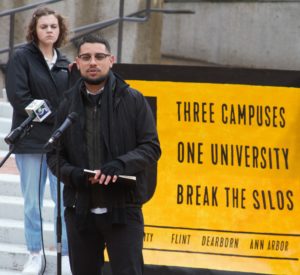
Asa Zuccaro, UM-Flint alumnus, speaks at One University rally in McKinnon Plaza at UM-Flint. (Photo by Tom Travis)
“If you don’t see the economic value, think about the critical thought that you get from it — it’s powerful,” he said.
In his work, Zuccaro said he has learned a lot about Flint history. His family left Mexico 101 years ago andcame straight to Flint, living here into the era when the population in Flint exploded, a lot of economic opportunity, as well as a lot of migration from the South.
As a community leader, Zuccaro said “I get in meetings and it’s wild to see how many people are UM – Flint alumni running our institutions here. And I think its so important, that democratic process, that inclusion of thought, because if people don’t understand what it’s like to come from Flint, to study in Flint, then how would you understand that? A lot of our student population become leaders in their own communities — and it’s so important to highlight, it’s important for the experiences of Flint and Dearborn to be elevated, and why there’s a need for equitable funding.”
Dan Birchok
In comments after the rally, Birchok, associate professor of anthropology, expanded on rumors that a major investment in on its way to UM – Flint, and expressed concern that the criteria for how it is used could leave out large chunks of the university’s humanities and liberal arts options.
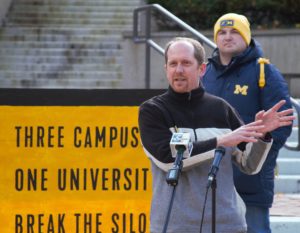
Anthropology professor Dan Birchok speaks at One University rally in McKinnon Plaza at UM-Flint. (Photo by Tom Travis)
“I’m very concerned about the ways wealthy institutions are maintaining their liberal arts and sciences, but how less wealthy institutions aren’t doing that — and what that means for personal enrichment, what it means to be a person, but also what it means to the economic opportunities of the students.
“The liberal arts, the humanities, are pathways to upward mobility,” Birchok said.
“I cannot walk down Saginaw Street without bumping into a student or former student who is who is working in community development, or running their own business, or working in the arts, making life better for people here while they’re earning a living.
“It really frustrates me that this is not part of the equation,” Birchok said as he sees UM administration considering the “Strategic Transformation” options. He said when he talks to Dutta about it, the Chancellor has said, “We have to do what’s important for students FIRST, and then we can support the arts,” assuming that the specialized technical training is the top priority.
“The word on the street,” Birchok said, ” is that we’re looking at a very large investment, tens of millions, a lot of money coming to UM- Flint, from central UM funding. That’s great, something 1U is fighting for. We are proud of that,
“But the problem is two-fold: the money has been promised but hasn’t been allocated, and the allocation process has lacked transparency, Birchok said, and the possibility looms that those funds will funnel to high growth programs and under performing programs won’t see any of it….
“How are we measuring these things?” he asked. “There is a both/and approach. The appropriate thing to do, according to our values, is to support all of the things. We can afford to do both.
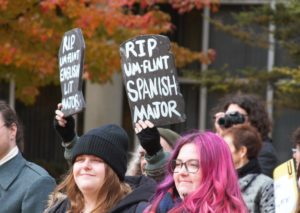
Participants at the One University rally in McKinnon Plaza at UM-Flint. (Photo by Tom Travis)
“The enrollment issues are real. We should be investing in high enrollment programs. Nobody here is saying don’t invest in public health, for example — those can be economic engines for the institution.
“But we should set funds aside for other things we think are important. The economist David Deming points out we need to be doing all the things in higher education, and he points out that in the salary race, engineers sprint — but English majors endure.”
“The transformations happening on our campus make me very sad and quite worried about the future,” Birchok said in a follow up email. “It’s especially irksome given that we could accomplish the changes desired by many elites without destroying the many great things that we already do.”
From the rally, the group walked to the Regents’ meeting at the Riverfront Center where they wielded signs and applause for their causes and speakers from the audience.
EVM Consulting Editor Jan Worth-Nelson can be reached at janworth1118@gmail.com. Worth-Nelson worked for UM – Flint from 1987-2013, most of those years as writing faculty in the English Department, and retiring as director of the Thompson Center for Learning and Teaching.


You must be logged in to post a comment.